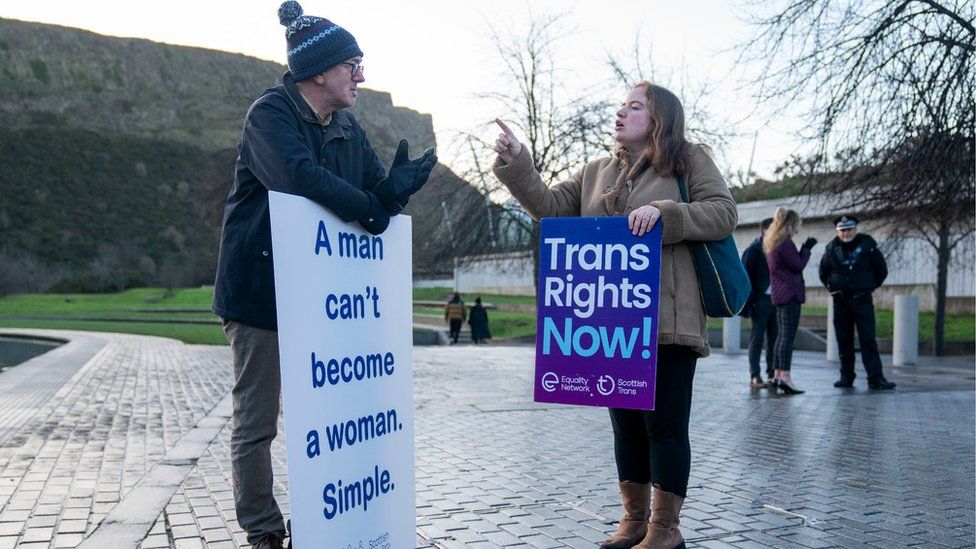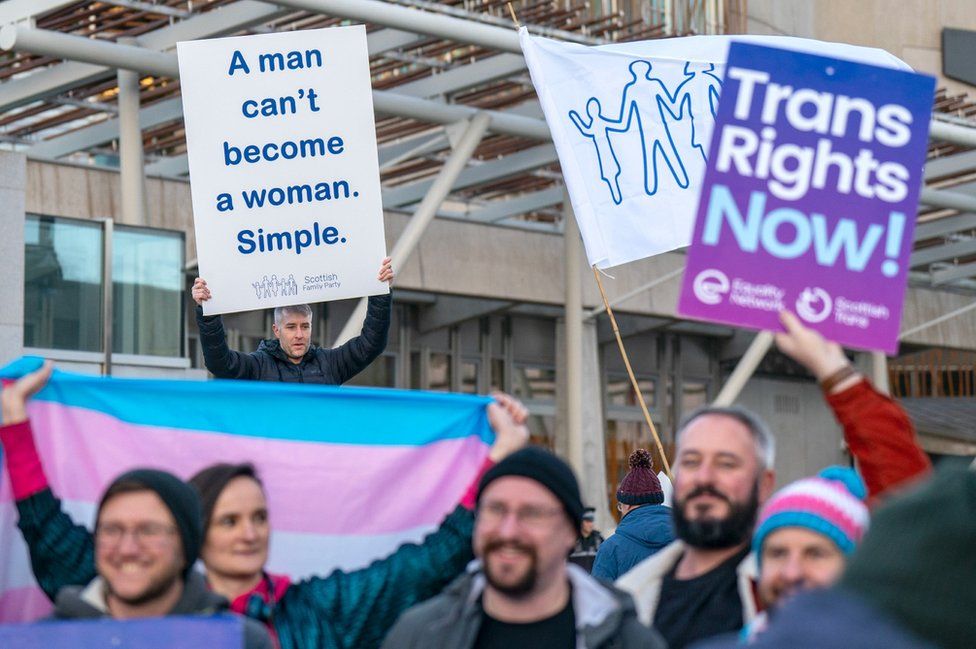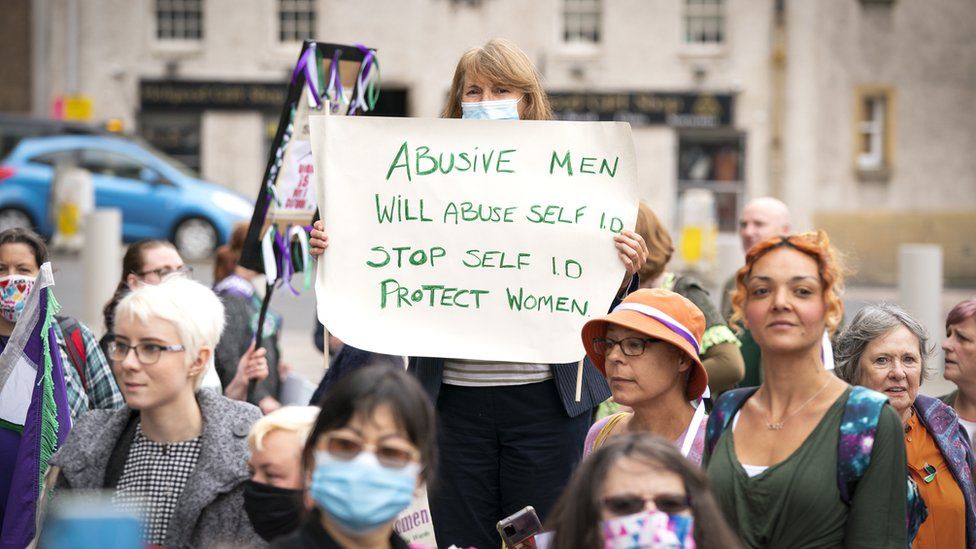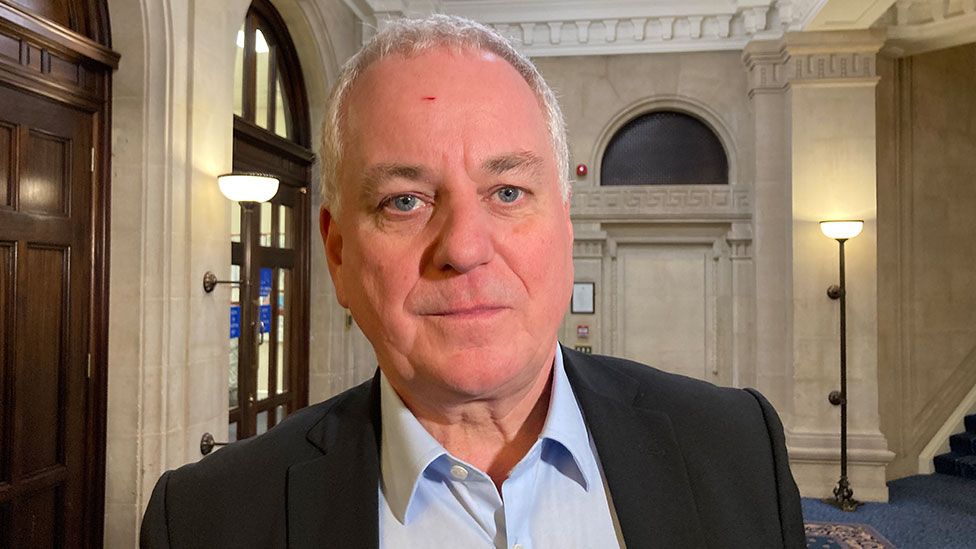MSPs to vote on changes to gender reforms
Maggie Chapman #MaggieChapman

MSPs will begin voting on final changes to gender recognition reforms at Holyrood later.
The Scottish government legislation is aimed at simplifying and speeding up the process for trans people to change their legally recognised gender.
Supporters say the reforms will make the process less intrusive, bureaucratic and medicalised.
Critics say they could put vulnerable young people at risk and undermine protections for women and girls.
Supporters and opponents of the bill have started gathering outside Holyrood ahead of the voting process getting under way.
Around 150 amendments have been put forward, with MSPs expected to sit late into the evening, and a final crunch vote scheduled for Wednesday
The Gender Recognition Reform (Scotland) Bill removes the need for a medical diagnosis of gender dysphoria to acquire a gender recognition certificate (GRC).
It cuts the need to live in their acquired gender from two years to three months, with a further three month period of reflection, and it lowers the age for applicants from 18 to 16.

Image source, PA Media Image caption,
A member of the Scottish Family Party (left) and a supporter of the Gender Recognition Reform Bill outside the Scottish Parliament
Ahead of the votes, Social Justice Secretary Shona Robison has written to three MSPs asking them to withdraw proposed changes to the legislation – or risk delaying its passage through parliament.
In a letter seen by BBC Scotland, Ms Robison warned the MSPs that their amendments would put the Bill at “serious risk” of being outwith Holyrood’s competence, adding that if they are passed, ministers would be forced to delay the final vote on the legislation.
The minister has written to Labour’s Jackie Baillie regarding an amendment that seeks to clarify the application of UK-wide equality laws.
The letter was also sent to Scottish Conservative MSP Russell Findlay and SNP backbencher Michelle Thomson.
They have tabled amendments that seek to provide extra safeguards in relation to applications by sex offenders.

Image source, PA Media Image caption,
Opponents and supporters of the bill gathered outside the parliament
Ms Robison said the changes risked being incompatible with the European Convention on Human Rights.
Supporters of the bill have begun to gather outside the Scottish Parliament ahead of the first of two days of debate.
More than 60 Scottish LGBT+ organisations have written to MSPs in support of the legislation, including Highland Pride.
Sand Owsnett, who chairs the group, said: “The current gender recognition process is outdated, dehumanising and excludes many trans people.
“The proposed reforms would not only bring Scotland closer to international best practice, but also uphold trans people’s human rights.”
![]()

MSPs are in for a marathon session, as they debate and vote on around 150 proposed changes to the legislation.
Amendments from three MSPs have caused the Scottish government particular concern. Ministers believe the changes being put forward by Jackie Baillie, Russell Findlay and Michelle Thomson could cause the legislation to fall foul of Holyrood’s competence, and therefore leave the bill open to legal challenge.
Should they pass, the government is warning it would have to withdraw the bill and send it back to the equalities committee for further consideration.
The Social Justice Secretary Shona Robison will be hoping her intervention deters the MSPs from pressing their amendments to a vote – and deters MSPs across the chamber from supporting them.
She doesn’t want to risk this legislation falling at the final hurdle, although that risk seems small. It would be a tall order for the three MSPs to garner enough backing.
![]()

Image source, PA Media Image caption,
Some women’s groups have raised concerns that the reforms could be abused
The Bill is controversial, with some concerned that it could make it easier for predatory men to access single sex spaces like refuges and prisons.
The UN’s special rapporteur on violence against women and girls has warned that the reforms could allow violent men to “abuse” the system.
The Scottish government has repeatedly said a new law would not affect the Equality Act 2010, which allows trans people to be excluded from some single sex spaces.
An amendment from Labour’s Pam Duncan-Glancy already backed by MSPs puts this assertion on the face of the Bill.
Ms Duncan-Glancy said the party had lodged further amendments designed to clarify the application of the Equality Act and protection of single-sex spaces.
“Labour’s priority is to make this a bill both trans people and the wider public can have confidence in,” she said.
“MSPs need to work together to protect human rights across the board and deliver a workable de-medicalised gender recognition process.”

Image caption,
Former First Minister Lord McConnell says the legislation should be paused for further discussion
On Monday Lord McConnell, a former first minister, said the legislation should be “paused” following a Court of Session ruling last week that sex was “not limited to biological or birth sex”.
“The Scottish Parliament was set up to pass good legislation and to improve public debate in Scotland and I think in this case, we’ve seen the opposite happen,” he told BBC Scotland.
However one of his successors as Scottish Labour leader, Kezia Dugdale, wrote in support of the bill in The Times and criticised the “populist” tactics of its opponents.
She pointed to the findings of a UN gender identity expert who found that in countries which already use self-determination, there was no evidence the laws were being abused by predatory men.
Meanwhile, the Scottish Conservatives have warned that the debate could lead to a “travesty of democracy” because a 15 minute time limit for each proposal will “shut down” discussion.
Scottish Conservative equalities spokeswoman Rachael Hamilton MSP said: “Recent polling suggests our concerns are shared by the majority of Scots, who are supportive of trans rights but also want women and girls to have safe spaces – and are rightly worried about teenagers being given the green light to do something they later regret.
“Rushing this through before Christmas is typical of the SNP’s attempts to railroad this legislation through parliament without proper scrutiny.”
But the Scottish Greens – who are in government with the SNP – described it as “the most scrutinised Bill in the history of the Scottish Parliament”.
“This is a significant and important Bill, but it has been met with one of the most spiteful and dangerous campaigns of disinformation since the lies against repealing Section 28,”MSP Maggie Chapman said.
First Minister Nicola Sturgeon has said that some people have “genuinely held concerns” about the plans but argued that others have latched on to the issue to spread transphobia.